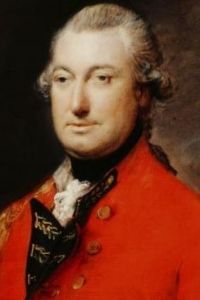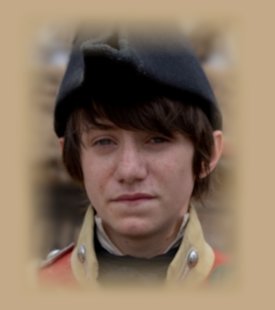Post by Charles Cornwallis on Jul 9, 2014 3:40:59 GMT
Name:Charles Cornwallis, 1st Marquess Cornwallis (eventual Marquess); currently 2nd Earl of Cornwallis
Age: b. 31 December 1738; 37
Patriot, Loyalist, Neutral/Undecided, Hessian, French, N. American: Loyalist (Colonel of the 33rd Regiment of Foot)
Physical Appearance: Cornwallis is a rather tall and strong man, though his strength is not the flashy sort but more a sense of strength and health rather than bulging muscle. He has naturally brown hair and surprisingly soft but serious and intelligent brown eyes but he often wears a white wig.
Strengths: Cornwallis is an intelligent officer with a mind for strategy, but is best at leading men in battle. He is rather gallant, having supported the colonists as a Member of Parliament, and tries to be as fair as possible. He realizes that there are some things in war that would be unacceptable in peacetime and wants nothing more than peace. He is fairly ambitious, hoping to be made General at some point and is willing to do almost whatever it takes to get it. He believes in quick movement in battle, as well as moving towards targets. He is known for his high morals, being loyal to his wife, and for expecting the same of others around him.
Weaknesses: Cornwallis can be a bit hot-headed, especially in battle, but he manages to keep it, and his slightly temper, mostly under control. He can be a bit snobbish at times, having grown up well-connected and fairly wealthy, as well as overly educated. Although he is full of energy and very brave on the battle field, both of those things can sometimes be his undoing. His morality can sometimes come off as high-minded and he can be a bit harsh to those that do evil, either on or off the battlefield.
Background: Charles Cornwallis was born December 31, 1738 to Charles Cornwallis, the 1st Earl of Cornwallis, and Elizabeth. His family was not spectacularly wealthy but they had plenty of connections, which were far more important than wealth alone. When he was old enough, he attended Eton, a place he would consider to shape him more than any other time. He had fond memories of his time there, despite the accident to his eye during a hockey game. He then gained an Ensign's commission and received permission to study military at Turin in Italy, but he first traveled with a Prussian officer. He spent two years there but was soon called to the Seven Years War. He tried to join the attack forces but instead became a staff officer of Lord Granby. He then participated in the Battle of Minden, after which he purchased a captaincy in the 85th Regiment of Foot. He then served with the 12th Foot and promoted to Lieutenant-Colonel. He participated in many battles during the Seven Years War.
At the end of the war, he became part of Parliament as part of the House of Commons. Two years after he became a member of the House of Commons, he became the 2nd Earl of Cornwallis and joined the House of Lords. He was one of the few peers that voted against the Stamp Act of 1765, having sympathy for the colonists. He remained supportive of the colonist. On July 14, 1768 he married Jemima Tullekin Jones, who was a daughter of a regimental colonel. He was happy married to her and they had two children: Mary, born June 28, 1769, and Charles. During this time, he was made a Colonel of the 33rd Regiment of Foot, but not in active service. With the outbreak of war, he became part of active service, despite his support of the colonists, putting his duty to his King and Country first.
Age: b. 31 December 1738; 37
Patriot, Loyalist, Neutral/Undecided, Hessian, French, N. American: Loyalist (Colonel of the 33rd Regiment of Foot)
Physical Appearance: Cornwallis is a rather tall and strong man, though his strength is not the flashy sort but more a sense of strength and health rather than bulging muscle. He has naturally brown hair and surprisingly soft but serious and intelligent brown eyes but he often wears a white wig.
Strengths: Cornwallis is an intelligent officer with a mind for strategy, but is best at leading men in battle. He is rather gallant, having supported the colonists as a Member of Parliament, and tries to be as fair as possible. He realizes that there are some things in war that would be unacceptable in peacetime and wants nothing more than peace. He is fairly ambitious, hoping to be made General at some point and is willing to do almost whatever it takes to get it. He believes in quick movement in battle, as well as moving towards targets. He is known for his high morals, being loyal to his wife, and for expecting the same of others around him.
Weaknesses: Cornwallis can be a bit hot-headed, especially in battle, but he manages to keep it, and his slightly temper, mostly under control. He can be a bit snobbish at times, having grown up well-connected and fairly wealthy, as well as overly educated. Although he is full of energy and very brave on the battle field, both of those things can sometimes be his undoing. His morality can sometimes come off as high-minded and he can be a bit harsh to those that do evil, either on or off the battlefield.
Background: Charles Cornwallis was born December 31, 1738 to Charles Cornwallis, the 1st Earl of Cornwallis, and Elizabeth. His family was not spectacularly wealthy but they had plenty of connections, which were far more important than wealth alone. When he was old enough, he attended Eton, a place he would consider to shape him more than any other time. He had fond memories of his time there, despite the accident to his eye during a hockey game. He then gained an Ensign's commission and received permission to study military at Turin in Italy, but he first traveled with a Prussian officer. He spent two years there but was soon called to the Seven Years War. He tried to join the attack forces but instead became a staff officer of Lord Granby. He then participated in the Battle of Minden, after which he purchased a captaincy in the 85th Regiment of Foot. He then served with the 12th Foot and promoted to Lieutenant-Colonel. He participated in many battles during the Seven Years War.
At the end of the war, he became part of Parliament as part of the House of Commons. Two years after he became a member of the House of Commons, he became the 2nd Earl of Cornwallis and joined the House of Lords. He was one of the few peers that voted against the Stamp Act of 1765, having sympathy for the colonists. He remained supportive of the colonist. On July 14, 1768 he married Jemima Tullekin Jones, who was a daughter of a regimental colonel. He was happy married to her and they had two children: Mary, born June 28, 1769, and Charles. During this time, he was made a Colonel of the 33rd Regiment of Foot, but not in active service. With the outbreak of war, he became part of active service, despite his support of the colonists, putting his duty to his King and Country first.









